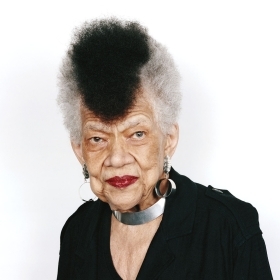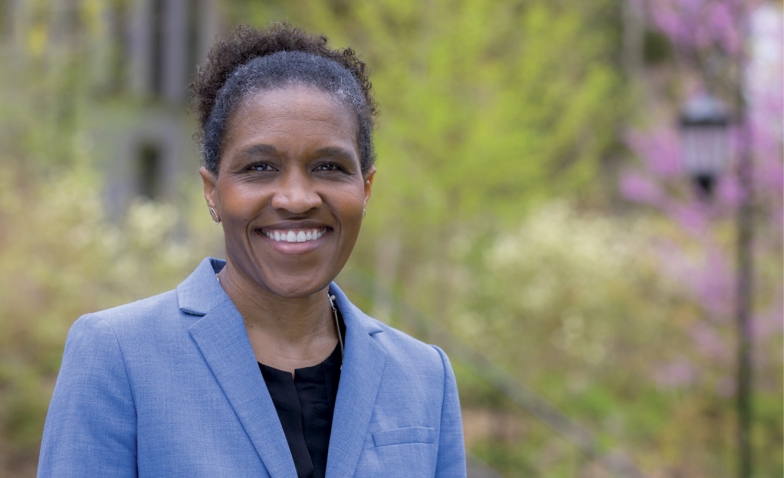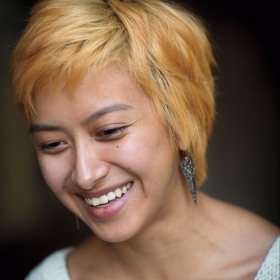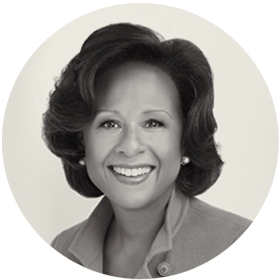Joy St. John, dean of admission and financial aid, didn’t expect to stay at Wellesley for so many years. “I’ve worked at five colleges and universities, but never anywhere for this long—two weeks shy of 12 years,” she says.
What held her here? “This was the first place I ever worked where the mission of the institution was so prominent in the community,” she says. “At Wellesley, you can go up to a student or a staff member or a faculty member, and even if they don’t know the mission word-for-word, they could paraphrase it. OK, this is why we’re here: to develop female leaders.”
A commitment to building a truly diverse student body also drove her. When announcing St. John’s decision to leave Wellesley this spring to serve as director of admission at Harvard College, President Paula Johnson said, “Under her leadership, Wellesley has recruited its most diverse classes, which has deeply enhanced the student experience.”
The chance to work with Johnson also kept St. John at Wellesley. “When they hired Paula, I could not believe how lucky I was,” she says. “They had hired someone whose educational mission and values were so closely aligned with mine. And it’s the first time in my life that I had had another Black woman as a boss, ever, in any job of any kind. It was just a really good match.”
St. John became interested in education administration during her undergraduate years at Stanford. “I was a poli sci major, and I had a lot of student leadership jobs affiliated with administrative offices. When I was thinking about what I wanted to do, I thought, ‘I want to be an administrator,’” she says.
After graduation, she worked in admission at an independent school. Then came a detour into law school. “I grew up in a house with my father, who didn’t graduate from college,” she says. “And my dad was all over me about going to grad school. He said, ‘You always loved Perry Mason and L.A. Law. You should go to law school.’ When I say that now as an admission person, I’m like, ‘Oh my God, that’s so the wrong reason.’”
She ended up at UCLA School of Law. “So, I’m in California, and there are a lot of really important ballot propositions during that time. One was Prop 209, which changed the California constitution to make it unlawful to consider race or gender in admission in public contracts. I was doing some work advocating against passing Prop 209, and realized that this was a really important issue in terms of the future of education,” St. John says.
After Prop 209 passed, during her last year of law school, St. John worked with the UCLA admission office on a new review process in compliance with Prop 209. “I decided that once I graduated, I wanted to go into admission in a leadership position focused on diversity recruitment. I was concerned that a lot of admission offices, especially in California, were going to limit their diversity recruitment because they were fearful that they didn’t understand the law,” she says.
At Wellesley, St. John says, “I’ve been really proud of the growth in the diversity of the applicant pool. Some of that’s demographics. Some of that is being test-optional. But it required an intentional strategy.”
Being at the forefront of change comes naturally, she says. “I’m going to be honest. I’ve always seen myself that way. My parents’ and my grandparents’ generation on both sides of my family were really active in civil rights and integrating different schools or professions. When I was growing up, I thought, ‘OK, it’s my generation’s turn. It’s my job to create change,’” she says.
Now, St. John is taking that energy for change across the river to Cambridge. “Harvard is in a really important place in the conversation about access and inclusivity and diversity and inclusive excellence,” she says. “Their platform is just so large. When Harvard makes choices, other institutions pay attention. They have the potential to move other institutions to action. And just to be there—you know, it’s like Hamilton—you want to be in the room where it happens.”
But she will miss Wellesley. “When I came here, it took me three months to not constantly think, ‘Huh, a majority of the people in charge here, that I’m seeing on a daily basis, are women.’ It was very conspicuous. Then after three months, it just seemed normal. It’s like being in feminist paradise, right? And I know that I’m going to miss that,” she says.








We ask that those who engage in Wellesley magazine's online community act with honesty, integrity, and respect. (Remember the honor code, alums?) We reserve the right to remove comments by impersonators or comments that are not civil and relevant to the subject at hand. By posting here, you are permitting Wellesley magazine to edit and republish your comment in all media. Please remember that all posts are public.